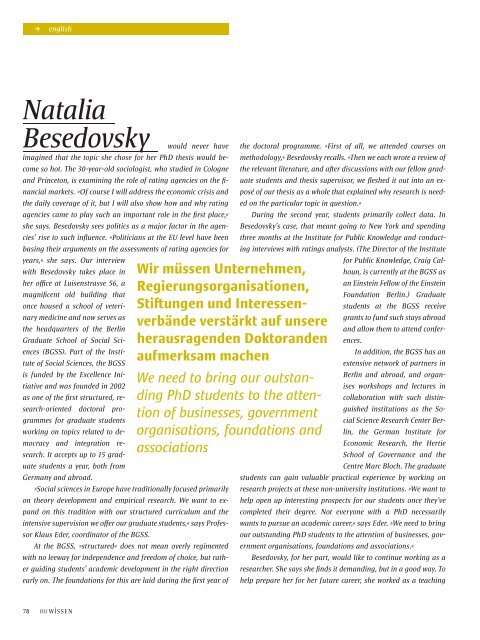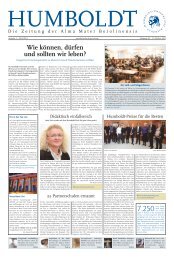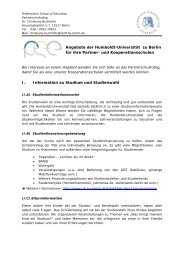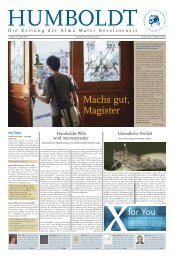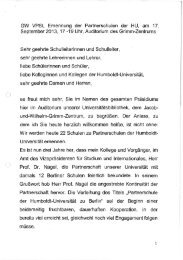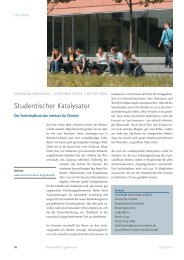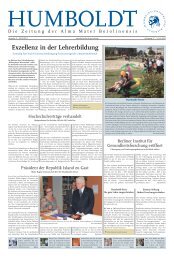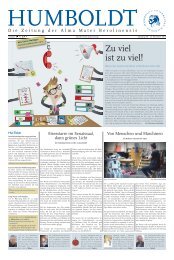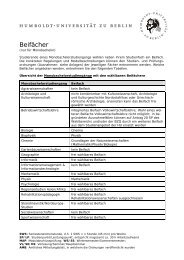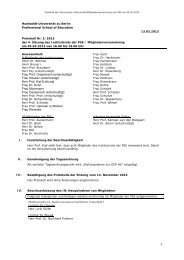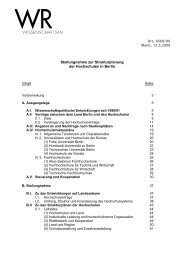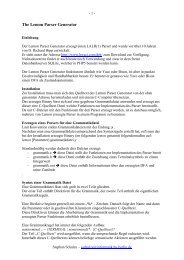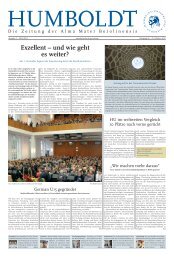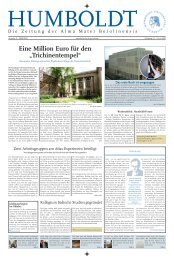hu wissen 3 (pdf) - Humboldt-Universität zu Berlin
hu wissen 3 (pdf) - Humboldt-Universität zu Berlin
hu wissen 3 (pdf) - Humboldt-Universität zu Berlin
Erfolgreiche ePaper selbst erstellen
Machen Sie aus Ihren PDF Publikationen ein blätterbares Flipbook mit unserer einzigartigen Google optimierten e-Paper Software.
k<br />
english<br />
Natalia<br />
Besedovsky<br />
would never have<br />
imagined that the topic she chose for her PhD thesis would become<br />
so hot. The 30-year-old sociologist, who studied in Cologne<br />
and Princeton, is examining the role of rating agencies on the financial<br />
markets. »Of course I will address the economic crisis and<br />
the daily coverage of it, but I will also show how and why rating<br />
agencies came to play such an important role in the first place,«<br />
she says. Besedovsky sees politics as a major factor in the agencies’<br />
rise to such influence. »Politicians at the EU level have been<br />
basing their arguments on the assessments of rating agencies for<br />
years,« she says. Our interview<br />
with Besedovsky takes place in<br />
her office at Luisenstrasse 56, a<br />
magnificent old building that<br />
once housed a school of veterinary<br />
medicine and now serves as<br />
the headquarters of the <strong>Berlin</strong><br />
Graduate School of Social Sciences<br />
(BGSS). Part of the Institute<br />
of Social Sciences, the BGSS<br />
is funded by the Excellence Initiative<br />
and was founded in 2002<br />
as one of the first structured, research-oriented<br />
doctoral programmes<br />
for graduate students<br />
working on topics related to democracy<br />
and integration research.<br />
It accepts up to 15 graduate<br />
students a year, both from<br />
Germany and abroad.<br />
»Social sciences in Europe have traditionally focused primarily<br />
on theory development and empirical research. We want to expand<br />
on this tradition with our structured curriculum and the<br />
intensive supervision we offer our graduate students,« says Professor<br />
Klaus Eder, coordinator of the BGSS.<br />
At the BGSS, »structured« does not mean overly regimented<br />
with no leeway for independence and freedom of choice, but rather<br />
guiding students’ academic development in the right direction<br />
early on. The foundations for this are laid during the first year of<br />
Wir müssen Unternehmen,<br />
Regierungsorganisationen,<br />
Stiungen und Interessenverbände<br />
verstärkt auf unsere<br />
herausragenden Doktoranden<br />
aufmerksam machen<br />
We need to bring our outstanding<br />
PhD students to the attention<br />
of businesses, government<br />
organisations, foundations and<br />
associations<br />
the doctoral programme. »First of all, we attended courses on<br />
methodology,« Besedovsky recalls. »Then we each wrote a review of<br />
the relevant literature, and aer discussions with our fellow graduate<br />
students and thesis supervisor, we fleshed it out into an exposé<br />
of our thesis as a whole that explained why research is needed<br />
on the particular topic in question.«<br />
During the second year, students primarily collect data. In<br />
Besedovsky’s case, that meant going to New York and spending<br />
three months at the Institute for Public Knowledge and conducting<br />
interviews with ratings analysts. (The Director of the Institute<br />
for Public Knowledge, Craig Calhoun,<br />
is currently at the BGSS as<br />
an Einstein Fellow of the Einstein<br />
Foundation <strong>Berlin</strong>.) Graduate<br />
students at the BGSS receive<br />
grants to fund such stays abroad<br />
and allow them to attend conferences.<br />
In addition, the BGSS has an<br />
extensive network of partners in<br />
<strong>Berlin</strong> and abroad, and organises<br />
workshops and lectures in<br />
collaboration with such distinguished<br />
institutions as the Social<br />
Science Research Center <strong>Berlin</strong>,<br />
the German Institute for<br />
Economic Research, the Hertie<br />
School of Governance and the<br />
Centre Marc Bloch. The graduate<br />
students can gain valuable practical experience by working on<br />
research projects at these non-university institutions. »We want to<br />
help open up interesting prospects for our students once they’ve<br />
completed their degree. Not everyone with a PhD necessarily<br />
wants to pursue an academic career,« says Eder. »We need to bring<br />
our outstanding PhD students to the attention of businesses, government<br />
organisations, foundations and associations.«<br />
Besedovsky, for her part, would like to continue working as a<br />
researcher. She says she finds it demanding, but in a good way. To<br />
help prepare her for her future career, she worked as a teaching<br />
78


